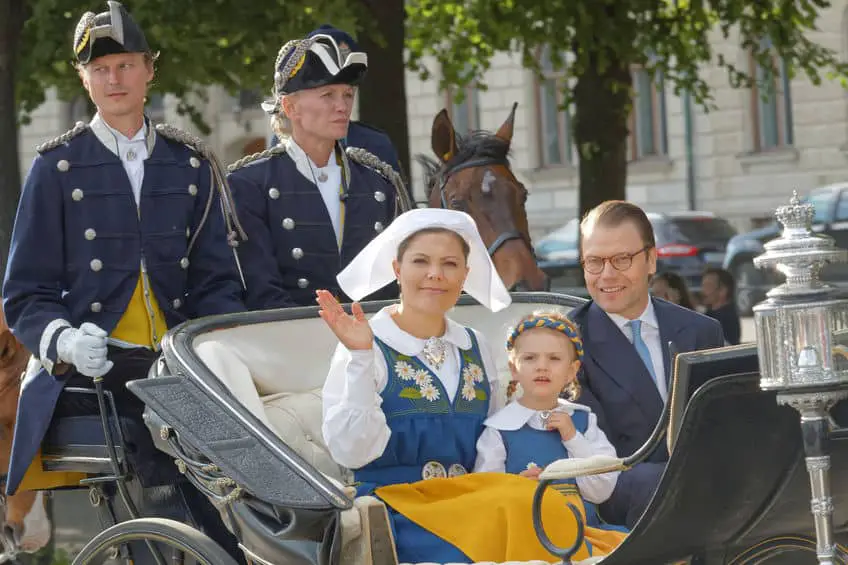Some great-grandfathers lived in Europe but chose to immigrate to America instead of staying in Germany or England. One of the reasons they may have made this choice is because of the law of primogeniture or the law of succession.
Primogeniture is the law or right for the firstborn legitimate son to inherit their parent’s entire estate, such as land and houses. In the later part of the 18th century, many places in the world started to rebel against the restrictions of the primogeniture succession law. In Jane Austen’s novels, one of the major themes was the effect this law had on women having to “marry well” to survive.
Table of Contents
- What is Primogeniture or the Law Of Succession?
- Rebellion Against the Primogeniture System
- Jane Austen’s England and Primogeniture Laws
- The Law of Primogeniture and the Colonization of America
- Primogeniture and Succession To the Swedish Throne
- Related Questions
Today most places in the world do not practice primogeniture. As recent as 1980, Sweden changed their royal succession law so that the oldest daughter, Crown Princess Victoria, would be next in line to the Swedish throne.
What is Primogeniture or the Law Of Succession?
Primogeniture is the law or right of the firstborn legitimate child (usually a male child) to inherit the parent’s entire estate. It was applied to real property such as land and houses but not personal property, ie jewelry or artwork. This law was different than the law for a shared inheritance among all or some of the children or other relatives or people. In most contexts, the firstborn legitimate son (agnatic primogeniture) would inherit the estate.
If that oldest son died and had a son, then the estate would be passed to his son and not to a surviving brother. It can be said that primogeniture is passed downward and not across a family line. Younger brothers usually never inherited the land and property as the bulk of the estate would go to the oldest brother and his heirs.
These laws were very common in Europe. For example, the Normans introduced primogeniture in England in 1066. The law remained in England without a valid will until 1925. In England today, most estates are shared equally among children, regardless of gender.
One of the reasons for the law was to protect the land of the wealthy landowners and aristocrats; for example, in England, the Lord of a manor would usually pass down his estates, lands, titles, and privileges over the peasants that worked for him to his oldest son or oldest male relative.
The younger sons would usually receive some support from their families to pursue a career in the military, church, or government. Parts of England before 1925 and Germany during the Nazi era had laws of ultimogeniture where the property would pass to the youngest son.
Rebellion Against the Primogeniture System
In the later part of the 18th century, this primogeniture system of succession came into attack in many parts of the Western world. This was due to the growing resistance against the privileges of the landed aristocracy. People wanted the land to be in the open market and not be passed down from birth.
Almost all the original colonies in the United States practiced the primogeniture succession laws. New England was the first area to abolish primogeniture inheritance. After the American Revolution, it was deemed un-American and abolished throughout the United States. In fact, within 15 years of the American Revolution, not one state had a primogeniture law on its books.
In France, the French Revolution (1789 – 1791) halted primogeniture inheritance. The Napoleonic code specified minimal amounts of an estate to each child.
In England, laws were modified so tenants could mortgage or sell their lands. In 1925, England wrote into law that in the absence of a valid will, the primogeniture succession law would not be used.
Jane Austen’s England and Primogeniture Laws
Many of Jane Austen’s novels reflect on the problems of the primogeniture laws of Regency England. A woman had no rights to property, so she had to “marry well” to survive. “Marry well” did not mean you married a man who loved or was even good to you, but you married a man who could financially provide for you.
Maureen B. Collins, a Professor of Law at the Marshall Law School in Chicago, wrote a paper about the legal issues faced by Jane Austen during her lifetime. The paper is called “The Law of Jane: Legal Issues in Austen’s Life and Novels.” In speaking about the effect of primogeniture laws, she said:
“In Austen’s England, the ownership of real property was the key to wealth and status. The devolution of real property operated under the shadow of the law of primogeniture, which provided that property passed to the eldest son on the death of the father. Although on the wane, the concept was still popular enough that Austen would have learned of examples of it in action. Because the purpose of the law of primogeniture was to keep land within the family and maintain large estates, no division of the property among siblings or others was permitted. The other children were allowed to inherit money and personal property.”
Maureen B. Collins
In Austen’s England, once a woman was married, all her property was controlled by her husband. She could own the property, but she could not profit from it. Once she was married, everything she owned now belonged to her husband, from her china dishes and artwork to any jewelry. A woman could not enter into a contract without her husband’s consent.
In other words, in Austen’s England, a husband could abuse his wife, and there was very little the wife could do it about it. The husband even controlled the children. If she left her husband, she had no right to the children, and the husband could assign someone other than the mother to be the child’s guardian. Divorce was also not common and was extremely expensive; divorce required an Act of Parliament.
In Austen’s England, the practice and effects of primogeniture are shown in the case of the Bennet family in Pride and Prejudice. The Bennet property was entailed, so it can only be left to a male heir. This left the family destitute upon Mr. Bennet’s death. It was also why one of the Bennet girls had to “marry well” to help support the rest of the family.
The Law of Primogeniture and the Colonization of America
Even though the American colonies had the law of primogeniture until after the American Revolution, the primogeniture law did impact the colonization of the United States. In places where the oldest son would inherit everything, the younger sons were not locked into staying close to home and could travel or move to other parts of the world.
This law meant the 2nd, 3rd, or 4th sons could pack up and travel away from their home countries to find a better life. If they wanted to own land as their older brothers did, many came to America to find the land they so desperately wanted.
When doing your genealogy research, you may wonder why a great-grandfather came to America even though his family had land and property in Europe. The law of primogeniture may help to explain the reason why. Even if he came from a wealthy family or a family with estates. If he was the 2nd or 3rd son, he did not receive any of the family land or estates.

Primogeniture and Succession To the Swedish Throne
In Sweden, the succession to the Swedish throne was to pass to the oldest son. But in 1980, Sweden changed the law to absolute primogeniture, which meant the oldest child, regardless of gender, would be the first in line for succession.
This change made Sweden the first country to adopt absolute primogeniture. Since 1810 Sweden had agnatic primogeniture, which meant that only the males could inherit the Swedish crown.
The change took place in 1980 but was backdated so that Crown Princess Victoria, born in 1977, would become the first in the line of succession to the Swedish throne.
In October 2019, King Carl Gustaf of Sweden took this one step further when he stripped 5 of his seven grandchildren of their royal highness status. One of the reasons he mentioned that he did this was so that they could have more control over their future destiny than if they still had the title and received support from taxpayer’s dollars. They are all still part of the Swedish royal family.
The primogeniture law of succession is a law that has been in place for many years in many parts of the world. When you are doing your genealogy, it is an important law to understand as it may help to explain why some of your family members left their homes to find land or livelihood in other parts of the world.
The Hummel Family is a website all about Family History research. We focus on Swedish, German, English, Scottish, and American Genealogy. We also discussed Asia and China, as we had ancestors who spent many years in China.
You are welcome to join us and become part of our community by signing up for our FREE newsletter, The Hummel Family; sign up by clicking here.
Check out our Youtube Channel, Family History Buzz, by clicking here.
Related Questions
What Are Somethings You Learn By Doing Your Family History Research?
By doing your family history, you can learn about new family members you did not know about. You will learn about the place where your family once lived. And finally, you can discover the traditions and culture of the country your ancestors once lived.
You can discover more by reading our blog 3 Things You Discover By Doing Your Family History by clicking here.
Why Do So Many Swedish Last Names End in Son?
When doing your Swedish family history research, one of the most important things you must understand is how Swedish last names work. Many Swedish last names have the ending of “son or “sson” as they are patronymic names.
You can find out more by reading our blog Why Do So Many Swedish Last Names End in Son? by clicking here.

